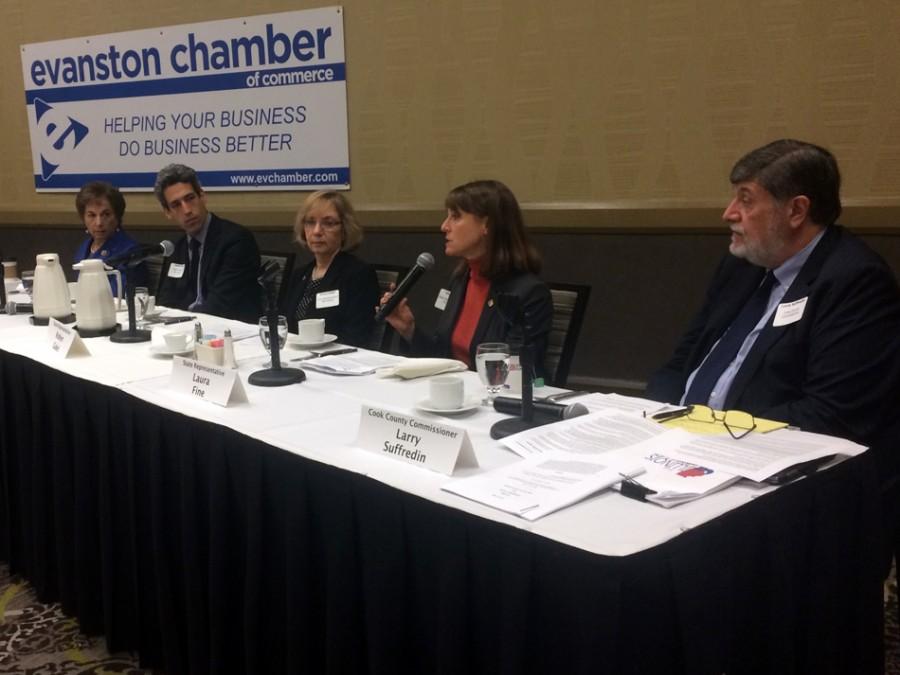Illinois politicians share grim outlook for budget proposal
Julia Jacobs/The Daily Northwestern
U.S. Rep. Jan Schakowsky (D-Evanston), state Sen. Daniel Biss (D-Evanston), state Rep. Robyn Gabel (D-Evanston), state Rep. Laura Fine (D-Glenview) and Cook County commissioner Larry Suffredin discuss Monday the implications of Gov. Bruce Rauner’s proposed “turnaround agenda” on Evanston. The panel was assembled for the Annual Legislative Business Leaders Breakfast, a yearly gathering of legislators from local, state and national levels.
May 12, 2015
Five Illinois legislators — all Democrats at local, state or national levels — forecasted Monday morning grim outcomes for Evanston and the state’s vulnerable populations as a result of Gov. Bruce Rauner’s proposed state budget.
State Sen. Daniel Biss (D-Evanston), U.S. Rep. Jan Schakowsky (D-Evanston), state Rep. Laura Fine (D-Glenview), state Rep. Robyn Gabel (D-Evanston) and Cook County commissioner Larry Suffredin spoke in a panel discussion at the Annual Legislative Business Leaders Breakfast. The politicians spoke to an audience of around 50 — many of them leaders of Evanston organizations — at the Hilton Garden Inn, 1818 Maple Ave.
Mayor Elizabeth Tisdahl set the tone for the discussion by opening with what she said was a “call of desperation” for the legislators to find a solution to Rauner’s proposed budget, which would cut funding from Evanston city services, non-profit organizations and public schools.
“It would come, if disaster struck totally, to as much as $19 million (from) the city of Evanston,” Tisdahl said. “We cannot afford to take that kind of hit, so we are looking for our legislators to lead us out of the mess that we’re in.”
The Illinois General Assembly has until the end of the legislative session on May 31 to approve Rauner’s “turnaround” budget. But, when a part of it was put up for a vote in the House last week, every Democrat voted against the plan while every Republican voted “present,” which has the effect of an abstention, Biss said.
“We’re going to have to do a lot better than that proposal to find a budget that can pass, but much more importantly, to find a budget that meets our responsibility as a state,” Biss said.
Gabel said the agenda’s slashes to human services hit the state’s vulnerable populations hard, particularly people with disabilities and the elderly. The budget proposal would disqualify one-third of people with disabilities from services entirely, and also reduce the portion of special needs children in early intervention programs, she said. The number of senior citizens who can receive services in their homes to stay out of nursing homes would also likely be cut by one-third, she added.
The agenda’s built-in 31-percent cut to higher education funding would not only result in fewer classes for students, but also fewer jobs for people in the community — and those losses will reverberate back to local governments through less consumer spending, Fine said.
She said it is necessary to understand the potential impacts of these cuts down the line and plan for those losses with solutions, such as raising taxes.
But “tax increases” are fighting words in Illinois, Suffredin said.
“Most people are against just random tax increases — we’re for fair taxation,” Suffredin said. “What’s going on right now is wherever the governor has allies, he’s trying to create a vice to squeeze local units of government like Cook County.”
Although Illinois is the 18th richest state in the United States, according to WalletHub, the government is operating within a framework of scarcity, Schakowsky said. The problem is not income itself, but an extreme income inequality that is “devastating” the state’s economy, she said.
“I saw a panel that was generally worried,” Ald. Mark Tendam (6th) told The Daily after the event. “It is the most worried I’ve ever seen them.”
But despite what he called the “rhetoric of despair,” Biss said a solution is achievable. With some compromise, the state has the resources — both financially and culturally — to get through these difficult times, he said.
Ald. Delores Holmes (5th) said Evanston residents often question local city officials about solutions to cuts to services like child care, but they don’t realize the source of the problem is at the state level. The solution, she said, will have to come from the legislators in Springfield.
“For them the next 20 days are going to be very difficult,” Holmes said. “Everybody has to compromise a little bit. Nobody can get everything they want, and I think the governor is focused on getting what he wants.”
Email: [email protected]
Twitter: @juliarebeccaj


